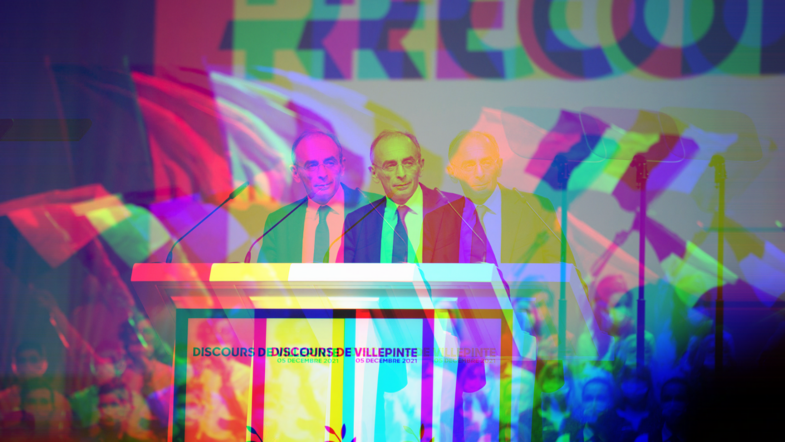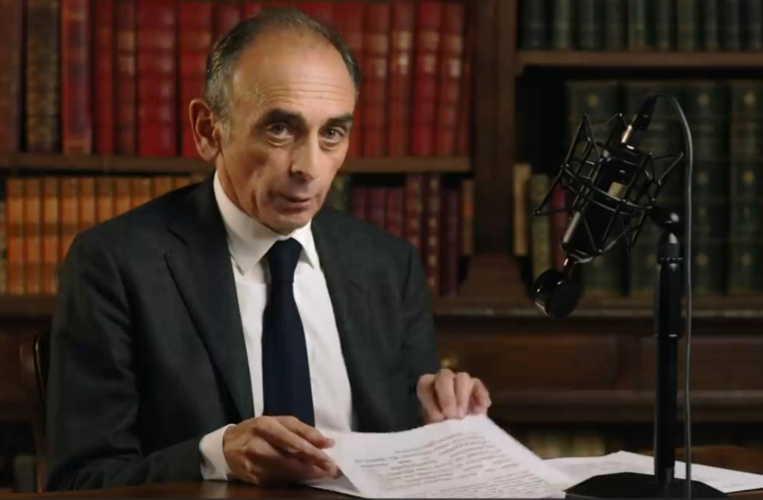While carrying out field work in Paris this past fall, I was often called upon to explain my research to French acquaintances and strangers. “I'm focusing on populism in France,” I would say, as simply as I could. Between raised eyebrows and exclamations that I had my work cut out for me, I was asked one question again and again: “Have you heard of Eric Zemmour?”
His name and likeness were inescapable, and yet Zemmour was not the person I had come to France to investigate. Of course, I knew about this far-right political journalist and TV personality, famous for incendiary works such as The French Suicide (an essay outlining what he views as France’s decades-long decline through immigration, feminism, and the breakdown of traditional values) as well as revisionist takes on history, not least of which his attempts to rehabilitate Vichy leader Marshal Philippe Pétain.1 Nonetheless, I had set out to study another far-right phenomenon—the National Rally under Marine Le Pen (formerly the National Front under Marine's father, Jean-Marie Le Pen). But while in Paris, I had the strong impression that the Le Pens, despite having been characterized as “the devil(s)” of French politics since the National Front’s initial breakthrough in the 1980s, were suddenly relegated to the category of “old news.”
The big story was as follows: Eric Zemmour, a reactionary polemicist who has never held public office, will run for president of France in the spring 2022 elections. While a flurry of media speculation surrounded his potential candidacy for weeks throughout the fall, he waited until November 30 to make his run official, unconventionally addressing his electorate through a video posted to YouTube. In his campaign announcement, which was staged to be reminiscent of Charles de Gaulle’s radio broadcasts to the Free French,2 Zemmour presented himself as the messianic candidate who could save a foundering French civilization from all that threatened it—particularly non-European immigration.3
Much like former U.S. president Donald Trump, to whom he is often compared, Zemmour has largely risen to his current level of notoriety through televised spectacle (promoted to no small degree by CNEWS, a TV network considered to be analogous to Fox News in the United States) and highly controversial statements about race, gender, immigration, and Islam (three of which have led him to be convicted for inciting hatred). With globalization, the European Union, and U.S. American hegemony in his line of fire, Zemmour advocates for a return to the prosperity and harmony of the “good old days” through the expulsion of certain immigrants and the promotion of French national sovereignty. Popular with many far-right Le Pen voters, but also some voters from the “traditional” French right (such as reactionary Catholics and free-market liberals who are fearful of immigration), Zemmour's arrival on the political scene has brought with it the threat of a “spoiler” effect, particularly for the National Rally; this has led several far-right ideologues (including Marine Le Pen's niece, Marion Maréchal) to call for either Zemmour or Le Pen to step down in the coming months.
His attention-grabbing rhetoric notwithstanding, it is astonishing that Zemmour’s candidacy has taken up so much space in the French media landscape; after all, his campaign has very slim chances of survival. In order to run for president, Zemmour—like every candidate in France who wishes to run for president—must obtain 500 signatures from French elected officials, mostly mayors, who themselves cannot give their official blessing to more than one candidate. Zemmour has competition in this arena: He is one of five far-right candidates attempting to accede to the Elysée Palace in 2022. Moreover, the polemicist's campaign team is young, inexperienced, and largely based in Paris; often accused of being amateurish, his operation lacks support or connections in the French heartland. Significantly, he does not have the backing of any major political party—an important distinction between him and Trump, who benefited from the enormous Republican Party apparatus.
This doesn't mean the impact of his run can or should be dismissed, however. While Zemmour's candidacy may not last into the spring, it does highlight several trends which merit our attention.
1. It points to the normalization of Marine Le Pen and the National Rally.
Since its establishment in the early 1970s, the National Front/Rally has transitioned from an upstart far-right party to one of the largest presences in the French political arena, at least when it comes to presidential and European parliamentary elections. As many readers will remember, Marine Le Pen was the second-round candidate to face off against Emmanuel Macron in 2017 and secured 34% of the vote,4 an all-time high for her party. The National Rally’s relative success has largely been attributed to Marine Le Pen’s softer image and policy of “de-demonizing”5 her party; in recent years, Le Pen fille has steered the National Rally toward a more protectionist, welfare-oriented economic platform and scrubbed the party’s ranks of its most controversial members, including her own father. As per this more pragmatic approach to politics, the party has moved away from its hardcore nationalist roots, professing loyalty to French republican values and (at least in Marine Le Pen’s case) refraining from engaging in debates over sexual morality. Despite her continued hard line on immigration and “national preference” for welfare allocation, Le Pen almost comes off as modern and inclusive next to the retrogressive Zemmour.
While the National Rally continues to be shunned from coalitions with mainstream right-wing and moderate parties at nearly every level of government, the current fascination with anti-establishment candidate Zemmour—and his success in chipping away at Le Pen’s electorate—implies that Marine Le Pen may be considered by more and more voters as “part of the system,” an establishment candidate rather than a dark horse. Indeed, in the midst of widely reported political frustration, the historically low turnout in the 2021 French regional elections—which had a stronger impact on the National Rally than on other parties—suggests that Le Pen’s party has lost some of its outsider appeal.
2. It loudly signals a continued and possibly long-term splintering of the French right wing.
Through a platform which is laissez-faire on an economic level and reactionary on a social level, Zemmour is appealing to different segments of the French traditional right and far right who have felt left behind. Some commentators have noticed that his rhetoric mirrors that of Jean-Marie Le Pen before the “de-demonization” of the Front National, back when the Front National had a stronger appeal with archconservative Catholics and pro-monarchists; much like Zemmour, Le Pen père also stirred up controversy (and attracted media attention) through discriminatory and historically revisionist remarks. (Famously, Jean-Marie Le Pen even remarked in late September that he might support Zemmour’s candidacy over that of his own daughter, as he found it more in line with his own worldview.) Conversely, far-right extremism expert Jean-Yves Camus has identified Zemmour as the manifestation of a xenophobic current that has long threatened to split the mainstream right-wing bloc, The Republicans (the party of former presidents Nicolas Sarkozy and Jacques Chirac).6
In truth, both of these possibilities are borne out by the electorate which has professed interest in Zemmour’s candidacy: He has drawn voters away from the National Rally’s camp, making a dent in Marine Le Pen’s poll numbers, but he has also attracted part of the electorate of The Republicans through his combination of neoliberal economic policy and his declared defense of Christian Europe. The question remains whether or not this splintering on the right will continue after next year’s elections, or if it will slip back beneath the surface as soon as Zemmour calls it quits.
3. It suggests the return of some old (intolerant) ideas and the integration of some newer (intolerant) ideas into mainstream French politics.
Zemmour’s discourse, which focuses heavily on national sovereignty and cultural clash, weaves together several different intellectual elements which until now have been lurking behind the scenes in French politics. On the one hand, he mobilizes ideas of a pre-World War II reactionary right, embodied by author and philosopher Charles Maurras, who deplored the French Revolution, defended the Catholic Church and a strong, nationalist state, and considered Jewish people as the nation’s greatest threat; however, Zemmour, himself Jewish, recasts the threat as Muslims. It’s important to note that this counterrevolutionary ideology precipitated the French state’s collaborationist role during World War II and its participation in the Holocaust, a historical fact which Zemmour has tried to deemphasize.7 On the other hand, he is riding the wave of the far-right Nouvelle Droite, or “New Right” movement, which emerged in France in the 1960s. Propagated by a small group of atheist intellectuals whose raison d'être was the preservation of a “pure” European culture and the separation of peoples along ethnic lines, the Nouvelle Droite was originally strictly apolitical, focusing instead on achieving the Gramscian notion of "cultural hegemony.” However, Zemmour has joined a growing chorus of political figures and journalists bringing the Nouvelle Droite’s ideas to the fore; seizing onto the “Great Replacement” conspiracy theory developed by another far-right intellectual, Renaud Camus, and touting the importance of achieving “cultural hegemony,” Zemmour has promoted the Nouvelle Droite’s intellectualization of societal issues in a way the Le Pens would not have dared.8
To this combination of old reactionary ideology and new identitarian theory, Zemmour has brought another seemingly incoherent element: a touch of populism. Despite his own status as a wealthy and highly educated intellectual—a de facto member of France’s elite—Zemmour has at least rhetorically jumped onto the populist bandwagon, posing as a defender of “the people” against an overbearing elite. In October, for example, he tweeted, “Democracy is the power of the people, by the people, for the people. It is popular sovereignty. We must give the power back to the people, to the majority, and reduce the power of judges and minorities.”9
All in all, the success of Zemmour’s Franken-discourse suggests that in addition to borrowing or resurrecting policies from rival political parties, he is also breathing life into once-marginalized ideas, offering them new staying power on the French political scene.
--
As these observations would suggest, and if we take the long view, Zemmour is hardly a novelty on the French political landscape. However, a perhaps more important and overarching conclusion that we could draw from his candidacy—and its impact on other candidates—is that a great deal of the agenda-setting in national French politics today is happening on the far right. As mentioned in the introduction of this article, there are quite a few candidates running for president of France, and aside from Macron (a center-right politician), the highest-performing candidates in the polls today are all squarely on the political right, and fashioning their campaigns to meet Zemmour’s challenge. (At the moment, Macron is estimated to win 26% of the vote; Marine Le Pen and Valérie Pecresse of The Republicans are neck and neck, with 17% and 16% respectively; and Zemmour is hovering around 12%. Meanwhile, the left-wing candidate with the highest predicted share of the vote is Jean-Luc Mélenchon of La France Insoumise (“Unsubmissive France”), with only 9%.10) The French far left has struggled to find its voice since the 1990s, while the moderate-left Socialist Party has only continued to flounder since its breakdown toward the end of the Hollande presidency. Can a charismatic candidate bring new momentum to a disintegrating left wing? We’ll find out this spring!
References
[1] The debate about Marshal Pétain has largely been put to rest; it is now broadly acknowledged in the French historical community that the Vichy chief of state signed off on his government’s acts of collaboration with the National Socialists, thus facilitating the deportation and murder of tens of thousands of Jews (many of whom were French-born, despite Zemmour’s claims that Pétain sought to protect them) during World War II.
[2] The Appeal of June 18, 1940 was the first speech delivered by Charles de Gaulle from London, where he had fled following the German invasion of France. De Gaulle sought to establish his role as the head of a government in exile and to encourage the French to resist the occupying forces. Incidentally, there is no recording of this speech, and few heard it at the time; however, photos and the speech’s manuscript survive, and Zemmour’s attempt to mirror this powerful moment in French history was noticed by many commentators. See: C dans l'air, “Clash, clip : où va Zemmour ? #cdanslair 01.12.2021,” December 2, 2021, YouTube
video, 1:04:29, www.youtube.com/watch.
Eric Zemmour, “Replay: Je suis candidat à l’élection présidentielle,” November 30, 2021, video, 10:12, lesamisdericzemmour.fr/zemmour-candidat-video/.
[4] “Emmanuel Macron defeats Le Pen to become French president,” BBC
, May 8, 2017, www.bbc.com/news/world-europe-39839349.
[5] In French, the word that is consistently used is dédiabolisation.
[6] Quotidien, “Invité: la popularité de Zemmour et Le Pen, avec Jean-Yves Camus, spécialiste de l'extrême droite,” October 4, 2021, TF1
[7] Marc Weitzmann, “Parcours et rhétorique d’Eric Zemmour,” Signes des temps de France Culture
, podcast audio, December 5, 2021, www.franceculture.fr/emissions/signes-des-temps/parcours-et-rhetorique-d-eric-zemmour.
[8] I will note here that the National Rally and its members, including Marine Le Pen herself, have occasionally mentioned the Great Replacement in media interviews, and that the Nouvelle Droite has influenced some powerful members of the National Front in the past. However, today this is treated as a sideshow to what the party considers the “real” issues (i.e., pocketbook issues).
Eric Zemmour, Twitter Post, October 19, 2021, 9:19 am, twitter.com/ZemmourEric/status/1450360855498006528.
[10] "Présidentielle 2022: Emmanuel Macron fait la course en tête," IPSOS
, January 7, 2022, www.ipsos.com/fr-fr/presidentielle-2022-emmanuel-macron-fait-la-course-en-tete.



































































